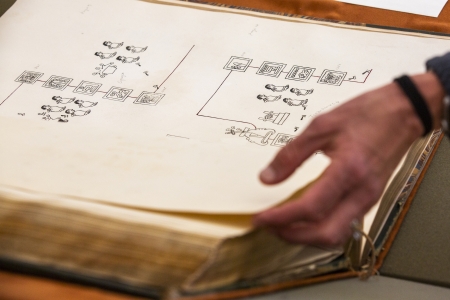In recognition and honor of Indigenous Peoples’ Day, Te’Lor Hawkins, a Harvard Library summer intern, writes about the importance of language preservation.
“More than 300 Indigenous languages were once spoken in the United States. But for decades this number has been in constant decline, and, on average, every two weeks an Indigenous language dies.”
During my time as one of Harvard Library’s summer interns, I was lucky to be exposed to poignant cultural experiences. Aside from more in-depth learning about my own culture, some of the most memorable experiences were my visits to Tozzer Library and the Peabody Museum. Tozzer's collection includes examples of several native languages; in some cases, Tozzer is preserving the only known written samples of these languages.

More than 300 Indigenous languages were once spoken in the United States. But for decades this number has been in constant decline, and, on average, every two weeks an Indigenous language dies.
Our visits to Tozzer and the Peabody Museum allowed me, and my fellow interns, to learn about Indigenous language extinction for the first time. Our values center admiring and recognizing one’s individuality. It was particularly striking to learn about the loss of Indigenous languages and how it can erode an individual’s connection to their culture.
Languages are more than just a way to communicate; people rely on language to connect to their culture and pass down histories, traditions, folklores, and songs. We all rely on linguistic diversity to preserve humanity's cultural heritage, and language extinction threatens our ability to understand the world.
In recognition of Indigenous Peoples’ Day, I want to shed light on the issue of language preservation in hopes of helping Indigenous people revitalize and preserve an essential part of their cultural heritage.
Here are some things that we can do to support the proliferation of Indigenous languages:
- Research the impact that European colonization, discriminatory laws, and assimilation policies have on the disappearance of Indigenous languages.
- Learn more from language preservationists like Harvard Divinity School alum, Marcus Briggs-Cloud.
- Read Indigenous language action plans.
- Listen to Indigenous speakers when they share their stories.
- Encourage the integration of Indigenous languages in school curricula.
- Learn about Indigenous programs.
- Provide encouragement and support for Indigenous people who want to learn and/or teach their language.
I hope that we will all support Indigenous communities and their languages on this day and beyond, because it is vital to emphasize indigeneity not only in the past but also in the present.
Te'Lor Hawkins, a Kansas City, Missouri native, is currently pursuing a master’s degree in Library and Information Science (MLIS) at the University of Missouri.